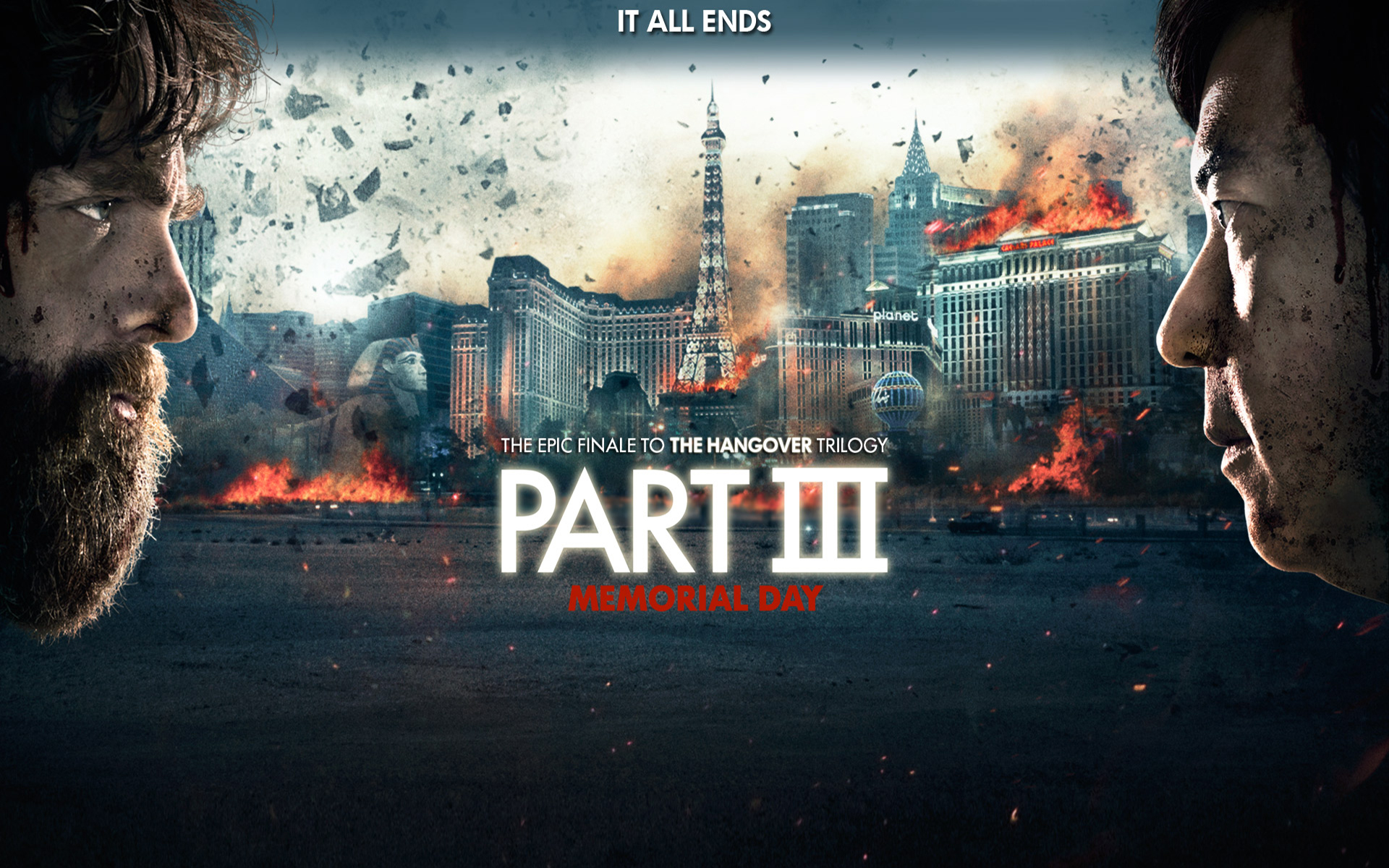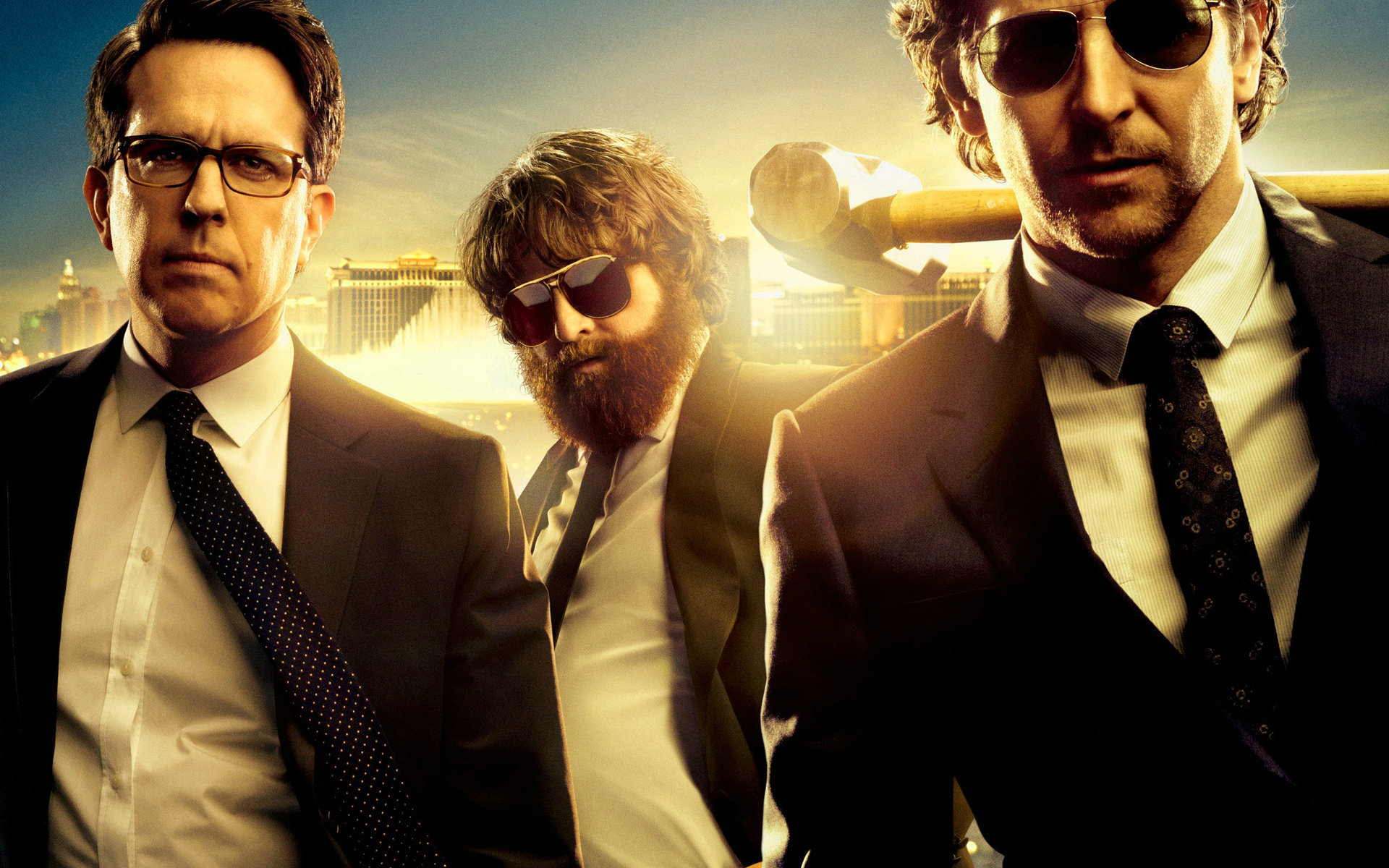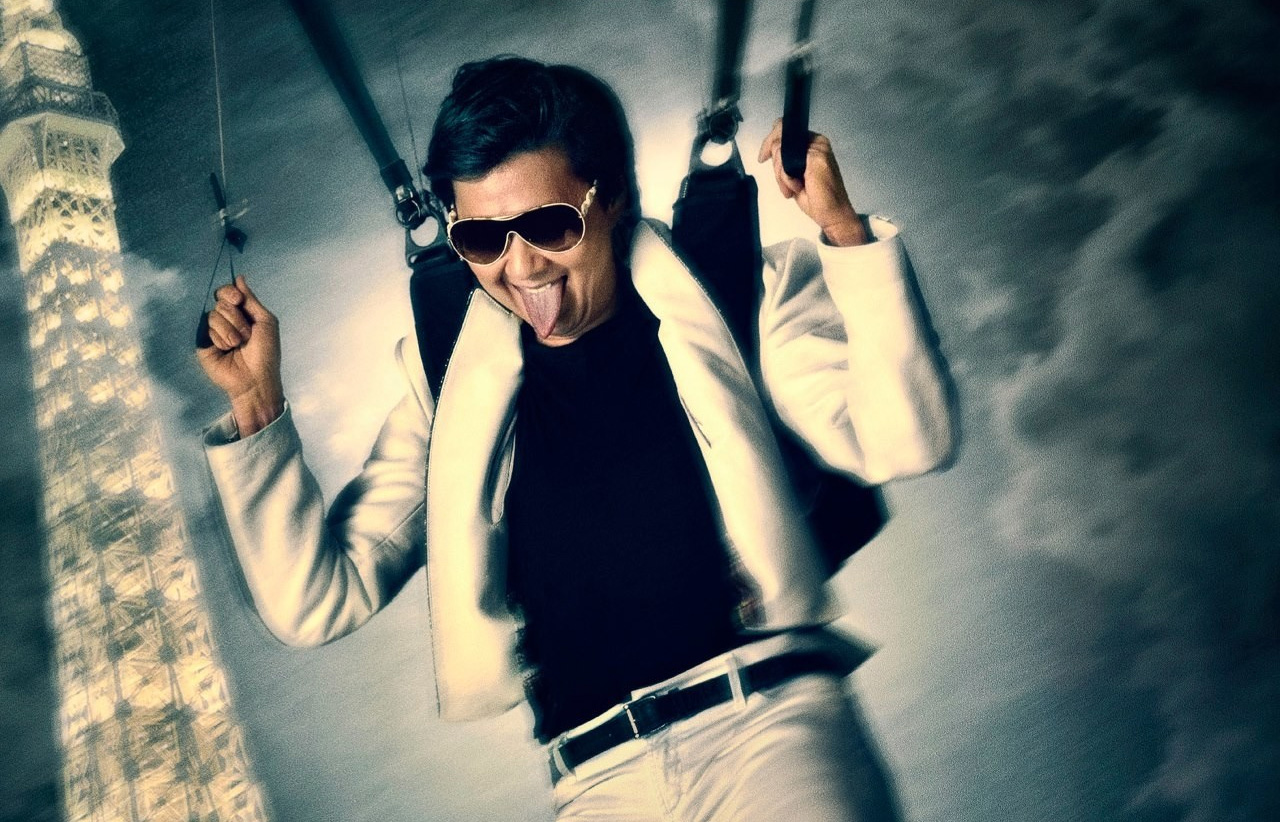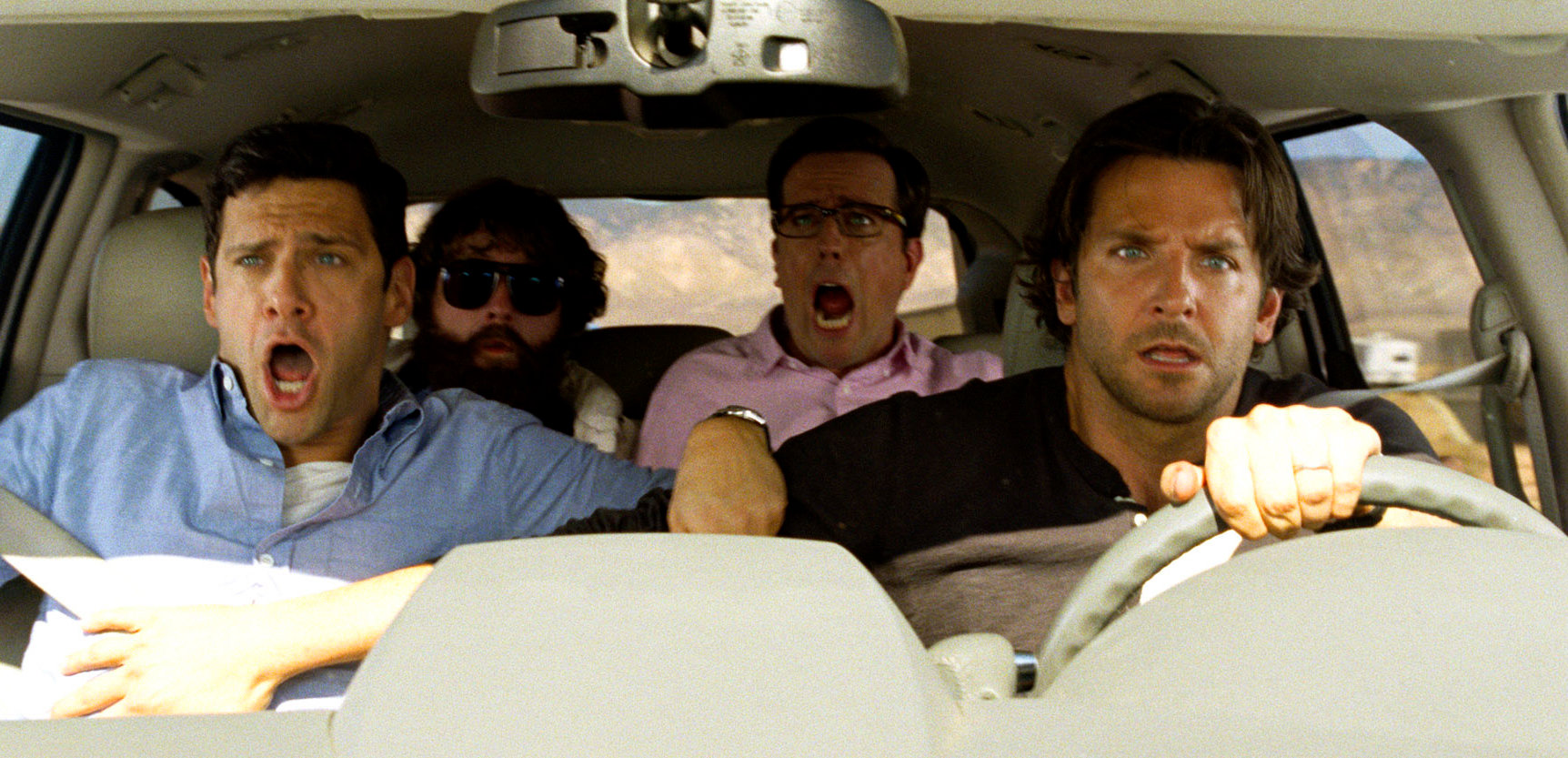The Hangover Part III Review: No Hangover Here

A poster to the final movie,
The Hangover Part III, shows Alan in a face-off with Mr. Chow where the background is littered with debris and dilapidated buildings. This, we understand, is a parody of the
Harry Potter poster which featured Harry and Voldemort in the same sort of face-off for
Deathly Hallows: Part II. So immediately, there is a sense of cleverness in saying that the entire series is coming to an end. Indeed it does. But I regret to inform it is too little too late as the cleverness the poster had is not seen anywhere in the film.
What we do see repeatedly are satirical jabs at other movies, like in the beginning when a prison guard walks coolly past a mob of incarcerated criminals warring it out with other guards to Mr. Chow’s cell and discovers Chow had escaped via
Shawshank-style. Like it weren’t obvious enough that the poster hanging loosely on the wall indicated Chow dug through it, we get a shot of the guard ripping the poster off the wall from the point of view of the tunnel facing the guard to fully embody the
Shawshank familiarity. I must say that making references like that to better movies is not a good start for any film (there is also a moment in the film where it plays on
The Shining when Phil tears down a brick wall with a sledgehammer, echoing the famous axe-to-door scene).

But that isn’t the end of the attempt at meta-humor as the focus shifts from Chow’s new life as a fugitive to Alan’s father’s sudden death. As a result of him not taking his medication for the past six months, coupled with causing the heart attack that killed his dad, Alan has an intervention set up by his family and friends. Leading up to the intervention, we are bombarded with flashbacks and nostalgic trips from the past two movies while the conversations during the intervention itself are reminiscent of a better time the Wolfpack had—all in all inspiring a look back at the original. The point of it all is for Alan to change his stubborn ways and to get him back on his meds, which make him seem more human. How else to explain Alan ignoring his mother when she says she loves him but crying when Phil says the same thing?
The gang then goes on a road trip to deliver Alan to a help center, but are bumped off and ordered to find Mr. Chow who has stolen more than $20 million worth of gold from Marshall (played by John Goodman), who we learn is the boss of the first movie’s drug dealer “Black Doug.”
As collateral, Marshall takes Doug and says he won’t give him back until the Wolfpack finds Chow and captures him. The motivation behind the whole outlandish premise, when Marshall utters the sentence “If there is anybody that can find him, it’s the Wolfpack,” is so unconvincing and arbitrary that you wait the rest of the movie for a more rational one.

What ensues are silly slap-stick antics including over-simplified robberies, roof-onto-deck jumps, and blind car chases. In today’s comedies, it almost always seems a car chase of some sort is required.
The fact that “it all ends” where it started isn’t very satisfying and neither is knowing Alan finds love. It all seems so forced and unnecessary, like the actors Cooper and Helms who are only on screen to provide some physical comedy and to cue the next scene. These two look so uncomfortable and out of place playing these roles here that whenever one of them speaks it is like watching an aside in theater.
Perhaps it’s because the movie is very Alan-Chow centered, leaning on their points of view to tell the story. In many movies, this could be interesting, even refreshing to know what and how somebody thinks. But the Alan character is so unlikable, and his sense of personality, morality and judgment so skewed and impenetrable that it makes your blood boil. He isn’t funny as much as he is being cruel. The longer it went on, the more I wished Alan was the one who was kidnapped as collateral instead of Doug.

But what happened? Where did the cleverness go? It must have disappeared in a plot that played it straight-forward instead of giving us a mystery to solve like the last two installments. Nobody gets drugged and nobody wakes up not knowing where they are or what happened. But it is excessive, almost like Director Todd Phillips thought that the only way to up the ante was to show more on-screen murders and animal cruelty.
Praise will be given to not sticking to formula (and it's good to see Heather Graham back, no matter how brief it is), but the novelty that intrigued audiences in the first movie is gone. Without the novelty, the audience engagement is nonexistent, and so too the fun.
 A poster to the final movie, The Hangover Part III, shows Alan in a face-off with Mr. Chow where the background is littered with debris and dilapidated buildings. This, we understand, is a parody of the Harry Potter poster which featured Harry and Voldemort in the same sort of face-off for Deathly Hallows: Part II. So immediately, there is a sense of cleverness in saying that the entire series is coming to an end. Indeed it does. But I regret to inform it is too little too late as the cleverness the poster had is not seen anywhere in the film.
What we do see repeatedly are satirical jabs at other movies, like in the beginning when a prison guard walks coolly past a mob of incarcerated criminals warring it out with other guards to Mr. Chow’s cell and discovers Chow had escaped via Shawshank-style. Like it weren’t obvious enough that the poster hanging loosely on the wall indicated Chow dug through it, we get a shot of the guard ripping the poster off the wall from the point of view of the tunnel facing the guard to fully embody the Shawshank familiarity. I must say that making references like that to better movies is not a good start for any film (there is also a moment in the film where it plays on The Shining when Phil tears down a brick wall with a sledgehammer, echoing the famous axe-to-door scene).
A poster to the final movie, The Hangover Part III, shows Alan in a face-off with Mr. Chow where the background is littered with debris and dilapidated buildings. This, we understand, is a parody of the Harry Potter poster which featured Harry and Voldemort in the same sort of face-off for Deathly Hallows: Part II. So immediately, there is a sense of cleverness in saying that the entire series is coming to an end. Indeed it does. But I regret to inform it is too little too late as the cleverness the poster had is not seen anywhere in the film.
What we do see repeatedly are satirical jabs at other movies, like in the beginning when a prison guard walks coolly past a mob of incarcerated criminals warring it out with other guards to Mr. Chow’s cell and discovers Chow had escaped via Shawshank-style. Like it weren’t obvious enough that the poster hanging loosely on the wall indicated Chow dug through it, we get a shot of the guard ripping the poster off the wall from the point of view of the tunnel facing the guard to fully embody the Shawshank familiarity. I must say that making references like that to better movies is not a good start for any film (there is also a moment in the film where it plays on The Shining when Phil tears down a brick wall with a sledgehammer, echoing the famous axe-to-door scene).
 But that isn’t the end of the attempt at meta-humor as the focus shifts from Chow’s new life as a fugitive to Alan’s father’s sudden death. As a result of him not taking his medication for the past six months, coupled with causing the heart attack that killed his dad, Alan has an intervention set up by his family and friends. Leading up to the intervention, we are bombarded with flashbacks and nostalgic trips from the past two movies while the conversations during the intervention itself are reminiscent of a better time the Wolfpack had—all in all inspiring a look back at the original. The point of it all is for Alan to change his stubborn ways and to get him back on his meds, which make him seem more human. How else to explain Alan ignoring his mother when she says she loves him but crying when Phil says the same thing?
The gang then goes on a road trip to deliver Alan to a help center, but are bumped off and ordered to find Mr. Chow who has stolen more than $20 million worth of gold from Marshall (played by John Goodman), who we learn is the boss of the first movie’s drug dealer “Black Doug.”
As collateral, Marshall takes Doug and says he won’t give him back until the Wolfpack finds Chow and captures him. The motivation behind the whole outlandish premise, when Marshall utters the sentence “If there is anybody that can find him, it’s the Wolfpack,” is so unconvincing and arbitrary that you wait the rest of the movie for a more rational one.
But that isn’t the end of the attempt at meta-humor as the focus shifts from Chow’s new life as a fugitive to Alan’s father’s sudden death. As a result of him not taking his medication for the past six months, coupled with causing the heart attack that killed his dad, Alan has an intervention set up by his family and friends. Leading up to the intervention, we are bombarded with flashbacks and nostalgic trips from the past two movies while the conversations during the intervention itself are reminiscent of a better time the Wolfpack had—all in all inspiring a look back at the original. The point of it all is for Alan to change his stubborn ways and to get him back on his meds, which make him seem more human. How else to explain Alan ignoring his mother when she says she loves him but crying when Phil says the same thing?
The gang then goes on a road trip to deliver Alan to a help center, but are bumped off and ordered to find Mr. Chow who has stolen more than $20 million worth of gold from Marshall (played by John Goodman), who we learn is the boss of the first movie’s drug dealer “Black Doug.”
As collateral, Marshall takes Doug and says he won’t give him back until the Wolfpack finds Chow and captures him. The motivation behind the whole outlandish premise, when Marshall utters the sentence “If there is anybody that can find him, it’s the Wolfpack,” is so unconvincing and arbitrary that you wait the rest of the movie for a more rational one.
 What ensues are silly slap-stick antics including over-simplified robberies, roof-onto-deck jumps, and blind car chases. In today’s comedies, it almost always seems a car chase of some sort is required.
The fact that “it all ends” where it started isn’t very satisfying and neither is knowing Alan finds love. It all seems so forced and unnecessary, like the actors Cooper and Helms who are only on screen to provide some physical comedy and to cue the next scene. These two look so uncomfortable and out of place playing these roles here that whenever one of them speaks it is like watching an aside in theater.
Perhaps it’s because the movie is very Alan-Chow centered, leaning on their points of view to tell the story. In many movies, this could be interesting, even refreshing to know what and how somebody thinks. But the Alan character is so unlikable, and his sense of personality, morality and judgment so skewed and impenetrable that it makes your blood boil. He isn’t funny as much as he is being cruel. The longer it went on, the more I wished Alan was the one who was kidnapped as collateral instead of Doug.
What ensues are silly slap-stick antics including over-simplified robberies, roof-onto-deck jumps, and blind car chases. In today’s comedies, it almost always seems a car chase of some sort is required.
The fact that “it all ends” where it started isn’t very satisfying and neither is knowing Alan finds love. It all seems so forced and unnecessary, like the actors Cooper and Helms who are only on screen to provide some physical comedy and to cue the next scene. These two look so uncomfortable and out of place playing these roles here that whenever one of them speaks it is like watching an aside in theater.
Perhaps it’s because the movie is very Alan-Chow centered, leaning on their points of view to tell the story. In many movies, this could be interesting, even refreshing to know what and how somebody thinks. But the Alan character is so unlikable, and his sense of personality, morality and judgment so skewed and impenetrable that it makes your blood boil. He isn’t funny as much as he is being cruel. The longer it went on, the more I wished Alan was the one who was kidnapped as collateral instead of Doug.
 But what happened? Where did the cleverness go? It must have disappeared in a plot that played it straight-forward instead of giving us a mystery to solve like the last two installments. Nobody gets drugged and nobody wakes up not knowing where they are or what happened. But it is excessive, almost like Director Todd Phillips thought that the only way to up the ante was to show more on-screen murders and animal cruelty.
Praise will be given to not sticking to formula (and it's good to see Heather Graham back, no matter how brief it is), but the novelty that intrigued audiences in the first movie is gone. Without the novelty, the audience engagement is nonexistent, and so too the fun.
But what happened? Where did the cleverness go? It must have disappeared in a plot that played it straight-forward instead of giving us a mystery to solve like the last two installments. Nobody gets drugged and nobody wakes up not knowing where they are or what happened. But it is excessive, almost like Director Todd Phillips thought that the only way to up the ante was to show more on-screen murders and animal cruelty.
Praise will be given to not sticking to formula (and it's good to see Heather Graham back, no matter how brief it is), but the novelty that intrigued audiences in the first movie is gone. Without the novelty, the audience engagement is nonexistent, and so too the fun.